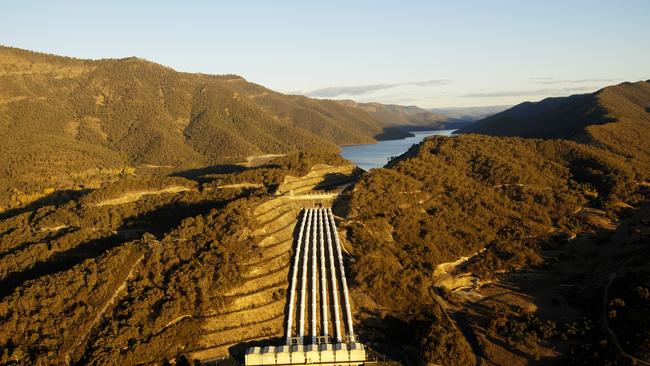Clough sold to Webuild amid financial distress
One of Australia’s oldest contractors will be sold to its Italian rival after months of financial strain.

One of Australia‘s oldest engineering companies, Clough, has been sold to Italy’s Webuild in a deal that rescues it from severe financial difficulties.
As first revealed by The Australian, Clough‘s South African parent company Murray & Roberts will sell the West Australian company to Webuild, its joint venture partner on the Snowy 2.0 energy project in NSW.
Clough employs 2500 people and was founded over a century ago in 1919 by brothers Jack and Bill Clough but was put up for sale in October as it tackled deepening financial problems and fears the company could be tipped into administration.
A deal would hand Webuild a $3bn order book – according to Murray & Roberts – in addition to high profile projects including Melbourne’s North East Link, the Perth rail link and the Inland Rail development.
But it would also significantly raise the stakes for the Italian contractor to deliver on several critical projects including Snowy 2.0 and the major electricity transmission scheme Energy Connect amid fears over the fragility of the national power grid.
“The group reviewed a number of strategic options to address Clough’s working capital needs, which have become increasingly urgent,” Murray & Roberts chief executive Henry Laas said. “Having reviewed all available alternatives and based on the above background, the board of directors of Murray & Roberts concluded that a transaction with Webuild was the preferred course of action.”
Webuild will pay only $500,000 in cash for Clough along with the keys to its multi-billion dollar order book. But key to the future of its South African parent is an agreement for Webuild to waive about $350m it owes to its WA subsidiary – a legacy of Murray & Roberts’ 2013 takeover of the company.
Clough lent Murray & Roberts $200m of the $446m needed to buy out its minority shareholders, and the money has never been repaid.
So acute is Clough’s cash crisis that Webuild will extend Clough a $30m interim lending facility to allow the company to cover payments to trade creditors until the deal completes.
“This is a critical step, as the energy, resources and infrastructure platform is in immediate need of a significant cash injection to service their order book and commercial commitments, which Murray & Roberts is not able to provide,” Mr Laas said.
Webuild said it had a “conditional” deal to buy Clough, depending on the positive outcome of due diligence. It pointed to Clough’s €4.8bn ($7.4bn) of order backlogs and preferred bids, revenues of €1bn with a financial debt-free balance sheet.
“Webuild will support Clough‘s financial reorganisation with the aim of turning it into the group’s platform in Australia, a strategic market with strong growth potential as infrastructure investments are expected to reach more than €300bn in the 2022-2025 period,” Webuild said. “The transaction would have Webuild take over minority stakes in projects in Australia carried out in partnership with Clough, including Snowy 2.0 and Inland Rail.”
It emerged last week that Clough will be forced to reverse profits declared in its financial statements due to the discovery of problems at two major contracts, according to Murray & Roberts, and amid an “ongoing and urgent” cash flow crisis.
Contractors including Clough are facing difficulties executing major projects amid soaring material prices and low-ball bidding, exacerbated through some projects such as Snowy 2.0 striking fixed price deals with contracting firms to limit their cost exposure.
Clough and Webuild filed more than $2.2bn of additional payment claims on Snowy 2.0, with its lead builders blaming the Covid-19 pandemic and surge in material prices for the cost hike.
Snowy Hydro’s expansion is currently a year behind schedule while the official budget has jumped by $800m to $5.9bn, the latest crunch points for an energy project deemed critical to replace coal in the power grid.
Clough’s parent flagged a major earnings downgrade in October amid an “acute” cash crunch at the troubled contractor. Murray & Roberts immediately pointed the finger at Clough’s engineering contracts on the $US650m ($1bn) petrochemicals plant under construction in Texas, Project Traveler, in addition to the Mitsui-operated Waitsia gas project.
Multiple subcontractors told The Australian that Clough’s financial problems appear to have accelerated in late 2021, when the company started delaying and even missing payments.
Clough’s precarious financial position was reaching critical levels by May 2022, when rumours began to circulate in financial markets that it was looking for a financing package to battle through financial difficulties.
The Perth contractor has endured widespread problems in paying subcontractors and suppliers this year, sparking speculation the company would soon be tipped into voluntary administration unless its parent company was able to inject more funds.
The company’s 2021 financial accounts, filed with the corporate regulator last year, show the company made a $20.8m net profit and held cash of $246.3m.
Clough regularly files its annual financial reports with the corporate regulator by the end of October, but has yet to lodge its accounts for the year to June 30.


